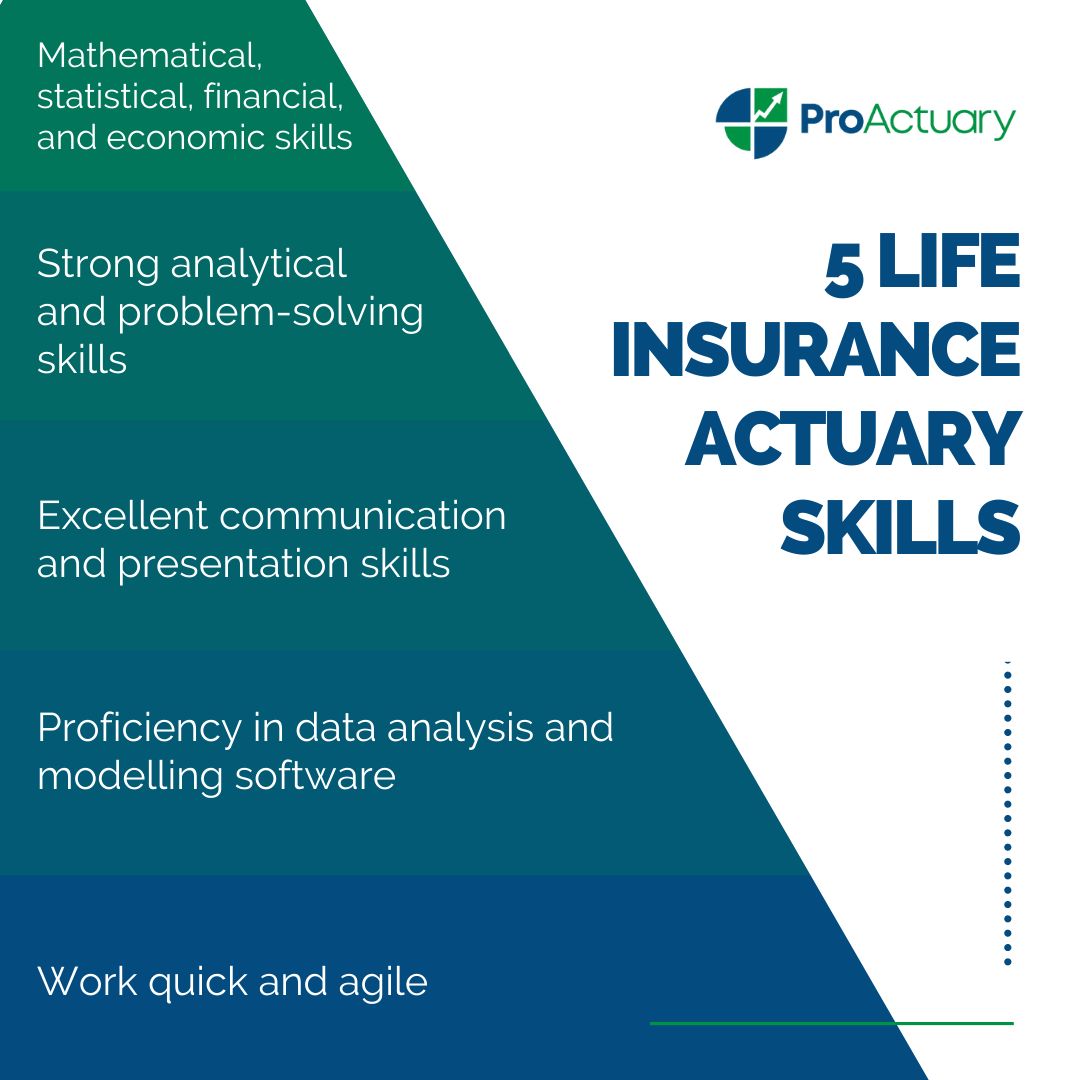Life Insurance Actuary Job Description
Curious what a typical life insurance actuary job description looks like? If you’re considering a career as a life insurance actuary, then it’s important to have a developed understanding of the job description, the qualifications required to excel in this field, and the career opportunities and growth potential for the job.
Whether you’re just starting your actuarial career or you want to change course to another path, this post will provide valuable insights into the job description of a life insurance actuary, a sought-after role in the insurance industry.
What Is a Life Insurance Actuary?

In general, an actuary is responsible for evaluating and managing financial risks and uncertainties using advanced mathematical and statistical techniques. Actuaries work in a variety of fields, including insurance, healthcare, banking, investments, and pensions, among others.
Within the insurance sector, actuaries can specialise in life insurance. A life insurance actuary is a specialised actuary who works with the financial risks associated with life insurance policies and financial products that are contingent on a person’s life events.
Life insurance is a contractual agreement between an individual (the policyholder) and an insurance company, guaranteeing that the insurer pays a sum of money upon events such as death and disability. In the case of a death benefit, an amount of money is paid to the policyholder’s designated beneficiaries, which can be used to cover the funeral cost, pay outstanding debts, and cover living expenses for the individual’s dependents.
Working as a life insurance actuary is a coveted job title and is largely considered a challenging and rewarding career.
What Does a Life Insurance Actuary Do?
The life insurance actuary job description requires a deep knowledge and understanding of finance, economics, and statistics. They leverage this knowledge to design different insurance products, price them accurately and manage the risk for the life insurance company.
The life insurance actuary job description is multi-faceted. One part of a life insurance actuary’s job description is to set the appropriate premium for a life insurance product using historical data and statistical analysis based on the risk posed by the life insured.
For example, the life insurance actuary can determine the risk posed by a prospective life insurance client based on their underwriting factors, which include their age, gender, smoker status and medical history, among other things. Based on this information coupled with historical data of past claims, the life insurance actuary can decide whether to accept the risk (i.e. grant an insurance policy to the client) and they can price for it appropriately.

Apart from the pricing function, the life insurance actuary has to wear many other hats as well. They will often be involved in setting business cases for new products, running experience reviews for existing products and setting up appropriate reinsurance treaties for the insurance company.
Role of a Life Insurance Actuary
By exercising mathematical and actuarial statistical techniques, life insurance actuaries evaluate and manage the financial risks associated with life insurance policies and other financial products.
One part of the life insurance actuary job description is the pricing of life insurance products and setting appropriate reserves for life insurance claims to be paid out. These roles are often referred to as pricing and valuations respectively.
They are also responsible for technical marketing, which entails explaining the inner workings of the life insurance product to financial advisors in a clear way. This enables financial advisors to sell the appropriate cover to match the client’s needs.

Life insurance actuaries can also be involved in competitor analysis, financial reporting, fundraising and investor reporting, to name a few other roles they perform.
Life Insurance Actuary Roles and Responsibilities
While the job title may sound specific, the roles and responsibilities of a life insurance actuary are diverse.
If you’re considering a career in this position, consider the following life insurance actuary roles and responsibilities in the workplace.

The primary responsibilities in the pricing actuary’s job description include:
- Manage potential financial risks associated with life insurance policies and other financial products
- Gather and analyse large amounts of statistical data to predict future events, such as mortality rates and disability rates
- Design insurance policies based on the predictions of future events, including determining pricing and reserving for insurance products
- Assess the financial stability of the life insurance company
- Develop and implement risk management strategies, such as creating products that do not attract fraudulent behaviour by customers
- Determine appropriate pricing of life insurance policies
- Collaborate with industry professionals to ensure policies are beneficial for both policyholders and the insurance company
- Perform experience reviews, which involves periodically reviewing and updating policies, pricing, and assumptions to reflect current market trends
- Communicate findings, recommendations, and outcomes to relevant parties such as senior management
- Continuously enhance the models and tools used for forecasting and risk assessment
- Stay up-to-date with the latest industry regulations and standards
Life Insurance Actuary Skills
As you can tell from the roles and responsibilities above, the work of a life insurance actuary can be both rewarding and challenging. There are several key skills required to perform the job effectively.
Candidates must have a strong foundation in mathematical and statistical concepts, understand finance and economics, and have the discipline to complete the three to six+ years of study required to become a fully qualified actuary.
The effort required to become a life insurance actuary usually brings rewards as actuaries are well compensated, with excellent employment prospects and opportunities for career advancement.
If you have the following skills, then a career as a life insurance actuary might be the perfect fit for you.

Mathematical, statistical, financial, and economic skills
Life insurance actuaries need to have strong mathematical, statistical, financial, and economic skills to evaluate and manage the financial risks associated with life insurance policies.
These skills allow actuaries to analyse and interpret data to predict future events, such as mortality rates, lapse rates, disability rates and investment returns. Life insurance companies use this data to determine how much they should charge per life policy and how to invest the money they collect from policyholders.
Life insurance actuaries who specialise in valuations and reserving (see valuation actuaries) also use their knowledge of finance and economics to assess the solvency and financial stability of insurance companies, helping to develop and implement risk management strategies. This protects the company from insolvency and ensures all policyholders are covered in case a claim arises.
Strong analytical and problem-solving skills
Three critical components of the life insurance actuary job description are strong analytical skills, excellent problem-solving skills, and attention to detail. In this position, actuaries are constantly faced with complex and dynamic problems that require them to analyse large amounts of data and make decisions based on that analysis. Actuaries must be able to identify patterns and trends in data and use this information to make accurate predictions about future events.
Attention to detail is also a very important skill for a life insurance actuary, as small errors in data analysis can have a major knock-on effect when it comes to predictions and financial decisions down the line.
Excellent communication and presentation skills
Life insurance actuaries are single players in a bigger game. They often work with multiple other stakeholders such as the legal, finance and marketing teams who all make sure the life insurance company runs smoothly and grows sustainably.
As a life insurance actuary, it is important to have strong communication and presentation skills to convey complex mathematical and statistical concepts to non-experts effectively. Actuaries also need to share technical information with colleagues, clients, and senior management and must be able to present data and analysis clearly and concisely.
In some instances, life insurance actuaries are required to present findings and recommendations to various stakeholders and must be able to communicate their results compellingly. With excellent communication and presentation skills, actuaries can ensure that their work is understood and acted upon by those who need to make important business decisions.
Proficiency in data analysis and modelling software
Life insurance actuaries work with large data sets and complex information, so it’s important to be computer-literate and proficient in data analysis and modelling software. These technological tools help to effectively analyse and interpret large and complex data sets.
Not only do these tools help actuaries to analyse data and make accurate predictions, but they also streamline the work process, saving time and resources along the way.
Work quick and agile
The insurance field is constantly changing, and a life insurance actuary must be able to work under pressure and adapt to changes in the field. The job demands working under tight deadlines and making quick and accurate decisions based on complex data.
In the same breath, life insurance actuaries must have in-depth industry knowledge, including familiarity with relevant regulations and industry standards. These industry updates and developments must be applied to the work, ensuring that all results are relevant, accurate, and reliable.
Life Insurance Actuary Career Path

The road to becoming a life insurance actuary may be demanding, but the rewards and opportunities for advancement that come with being a life insurance actuary, make this role highly sought after.
The journey typically begins with a degree in a relevant field, such as mathematics, statistics, actuarial science, or economics. After graduation, aspiring actuaries can join the insurance industry as actuarial analysts. If they wish to become fully qualified actuaries, they must pass a series of professional exams. The actuarial exams are known to be challenging.
In the United Kingdom, these exams are set by the Institute and Faculty of Actuaries (IFoA), and the process is divided into two main components. The first component is the Core Principles (CP), and next is the Specialist Technical (ST) component. The CP exams are usually more technical with a heavy mathematics and statistics workload. The ST subjects require a bigger understanding of the theory and the principles underlying insurance.
Once an actuarial student has passed all of their exams, they will be qualified as an actuary and receive the title of Fellow. From here, they can start working as an actuary in various departments, such as pricing, valuation, risk management and technical marketing, to name a few. The job description of a pricing actuary is defined in more detail here.
As actuaries gain experience and pass additional exams, they can progress to higher levels of responsibility within the company, or they may choose to specialise in specific areas — such as life insurance.
Regardless of ambition and title, actuaries are encouraged to continue their professional development throughout their careers by taking courses, attending seminars, and keeping up to date on other developments.
Life Insurance Actuary Job Description Template
We have also created a life insurance actuary job description pdf template outlining the key responsibilities, requirements and skills and qualifications for a life insurance actuary candidate. This may be useful for you if you are a hiring manager seeking to hire a life insurance actuary. This pdf template can be downloaded from here.
Download the Life Insurance Actuary Job Description Template Here
Life Insurance Actuary Job Description FAQs
Additional Life Insurance Actuary Job Description Links
Life Insurance Actuary Jobs worldwide
Life Insurance Actuary Jobs Dublin
Life Insurance Actuary Jobs London
Life Insurance Actuary Jobs Birmingham
Life Insurance Actuary Jobs Belfast
Life Insurance Actuary Jobs New York
Life Insurance Actuary Jobs San Antonio
Life Insurance Actuary Jobs Kuala Lumpur
Life Insurance Actuary Jobs Singapore
Life Insurance Actuary Jobs Hong Kong
Life Insurance Actuary Jobs Jakarta
Life Insurance Actuary Jobs Johannesburg
Life Insurance Actuary Jobs Toronto



